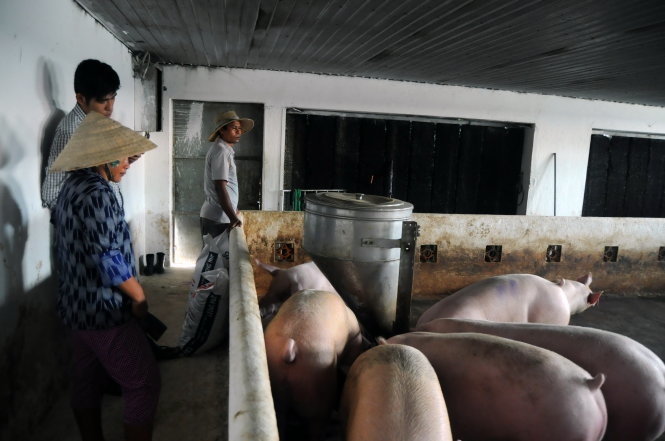 Society
Society

Measures to stop the use of banned substances and overuse of antibiotics in animal husbandry were discussed at a forum organised in Bình Dương Province on Tuesday.
 |
| Measures to stop the use of banned substances and overuse of antibiotics in animal husbandry were discussed at a forum organised in Bình Dương Province on Tuesday.— Photo tuoitre.vn |
BÌNH DƯƠNG - Measures to stop the use of banned substances and overuse of antibiotics in animal husbandry were discussed at a forum organised in Bình Dương Province on Tuesday.
Chu Đình Khu, head of the Animal Husbandry Department’s Animal Feed Division, said the rampant use of banned beta-agonist substances and antibiotics in animal feeding to stimulate growth and prevent diseases has made consumers feel insecure when using meat products.
Vietnamese laws allow 46 kinds of antibiotics and chemicals to be used in animal feed, with 24 having maximum dosages.
Inspection teams have found antibiotics being overused at many animal feed production plants as well as at pig and poultry farms, he said.
In addition, since last year, 58 out of 1,893 animal feed production plants inspected were found to be using banned substances.
Banned substances were found in 17 out of 1,239 animal feed samples and 257 out of 3,972 pigs, he said.
Improper use of antibiotics causes antibiotic resistance in animals, and residue in meat results in drug resistance in humans when it is consumed, he said.
Lê Thị Hồng Hảo, director general of the National Institute for Food Control, said consuming meat with industrial dyes to colour food and banned beta-agonists (salbutamol, ractopamine and metoprolol) to stimulate growth in animals and make them lean could affect human health, including causing acute and chronic poisoning.
Salbutamol residues can speed up the heart rate and cause dizziness, headaches and anxiety in humans, especially in those with heart diseases and hypertension, she said.
Nguyễn Văn Việt, the Ministry of Agriculture and Rural Development chief inspector, said intensified inspection by relevant agencies has “basically controlled” the import, distribution and use of banned substances in animal freeding.
The ministry would further intensify checks of animal feed producers and distributors, pig farms, and slaughterhouses to eradicate the use of banned substances and overuse of antibiotics, he said.
Phan Huy Thông, director of the National Agriculture Extension Centre, said awareness of the adverse effects of these substances on human health and on the image and competitiveness of the husbandry industry should be strengthened among farmers, slaughterhouse operators and consumers.
Authorities should publish the names of violators and tightly control the import of banned and harmful substances, he said.
Việt said following changes to the law in July, the use of banned and harmful substances in animal farming can lead to severe punishment, including prison terms of 20 years.
Together with better monitoring by relevant agencies, this is expected to eliminate the use of banned substances in animal breeding by the end of this year, he said.
Dr Nguyễn Văn Bắc of the National Agriculture Extension Centre said to develop the livestock industry in a sustainable manner, the agriculture sector needs to conform to VietGap standards and develop closed breeding chains to help reduce costs and control quality better.
The industry should teach farmers how to use organic methods to prevent diseases and use advanced technologies in animal farming, he said.
Many poultry and pig breeding models following VietGap standards have enabled farmers to be highly efficient and ensure food safety, he said.
At the forum, representatives of animal feed producing companies and farms in Bình Dương Province signed commitments to not use beta-agonists and not overuse antibiotics and co-operate with inspection agencies. - VNS




